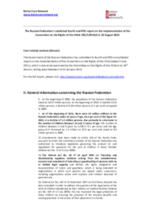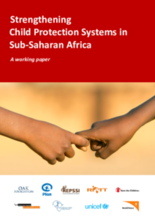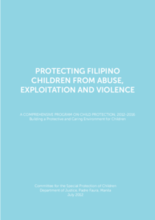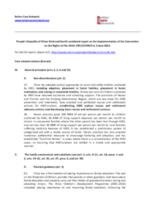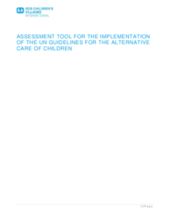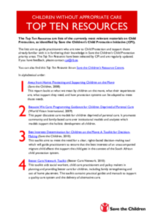Displaying 801 - 810 of 1028
Care related sections of the Government of the Russian Federation's fourth and fifth combined report on the implementation of the Convention on the Rights of the Child (dated 3rd June 2011).
This paper is a response to the increasing need for agreement on approaches and documented evidence of good practices consistent with system strengthening work. The purpose of the Inter-Agency Working Paper is to consolidate current thinking, examples and lessons learned about child protection system strengthening in sub-Saharan Africa and suggest a way forward.
This is a revision and update of the Comprehensive Program on Child Protection (CPCP). Now on its 3rd cycle covering the period 2012-2016, the CPCP provides the overall thrusts, directions, goals, strategies and interventions in the care and protection of Filipino children who are at risk, disadvantaged and vulnerable to various forms of abuse, neglect, violence and exploitation.
The People’s Republic of China issued its third and fourth combined report on the implementation of the Convention on the Rights of the Child in June 2012. This extract of the report focuses on sections relevant to children's care and in particular those addressing Family Environment and Alternative Care
This video showcases the Family-based care program of Save the Children and its partners in Indonesia.
This International Labour Organization (ILO) document introduces a new international standard adopted in June 2012, the Social Protection Floors Recommendation, 2012 (No. 202), that provides guidance to member States in building comprehensive social security systems and extending social security coverage by prioritizing the establishment of national floors of social protection accessible to all in need.
This International Labour Organization (ILO) brief introduces a new international standard adopted in June 2012, the Social Protection Floors Recommendation, 2012 (No. 202), that provides guidance to member States in building comprehensive social security systems and extending social security coverage by prioritizing the establishment of national floors of social protection accessible to all in need.
On May 2, 2012, in preparation of the Family Strengthening and Alternative Care Conference for Francophone Sub-Saharan Africa in Dakar, Senegal, BCN and the regional planning committee convened experts and practitioners to present and discuss the efforts to implement the Guidelines for the Alternative Care in the region. Watch this video for presentations, country level experience from Togo, and discussions on the pressing issues facing implementation in the region.
SOS Children's Villages has produced an assessment tool for the implementation of the UN Guidelines for the Alternative Care of Children. It has been designed to support the advocacy activities of SOS Children's Villages. The tool’s main focus is to measure a state’s obligations under the UNCRC, in providing quality care arrangements for all children who have lost parental care and those families at risk of separation
This ‘Top Ten Resources’ document lists the currently most relevant materials on Child Protection, as identified by Save the Children’s Child Protection Initiative (CPI).

